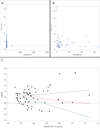Association of traumatic brain injury with subsequent neurological and psychiatric disease: a meta-analysis
- PMID: 26315003
- PMCID: PMC4751029
- DOI: 10.3171/2015.2.JNS14503
Association of traumatic brain injury with subsequent neurological and psychiatric disease: a meta-analysis
Abstract
Objective: Mild traumatic brain injury (TBI) has been proposed as a risk factor for the development of Alzheimer's disease, Parkinson's disease, depression, and other illnesses. This study's objective was to determine the association of prior mild TBI with the subsequent diagnosis (that is, at least 1 year postinjury) of neurological or psychiatric disease.
Methods: All studies from January 1995 to February 2012 reporting TBI as a risk factor for diagnoses of interest were identified by searching PubMed, study references, and review articles. Reviewers abstracted the data and assessed study designs and characteristics.
Results: Fifty-seven studies met the inclusion criteria. A random effects meta-analysis revealed a significant association of prior TBI with subsequent neurological and psychiatric diagnoses. The pooled odds ratio (OR) for the development of any illness subsequent to prior TBI was 1.67 (95% CI 1.44-1.93, p < 0.0001). Prior TBI was independently associated with both neurological (OR 1.55, 95% CI 1.31-1.83, p < 0.0001) and psychiatric (OR 2.00, 95% CI 1.50-2.66, p < 0.0001) outcomes. Analyses of individual diagnoses revealed higher odds of Alzheimer's disease, Parkinson's disease, mild cognitive impairment, depression, mixed affective disorders, and bipolar disorder in individuals with previous TBI as compared to those without TBI. This association was present when examining only studies of mild TBI and when considering the influence of study design and characteristics. Analysis of a subset of studies demonstrated no evidence that multiple TBIs were associated with higher odds of disease than a single TBI.
Conclusions: History of TBI, including mild TBI, is associated with the development of neurological and psychiatric illness. This finding indicates that either TBI is a risk factor for heterogeneous pathological processes or that TBI may contribute to a common pathological mechanism.
Keywords: ALS = amyotrophic lateral sclerosis; CI = confidence interval; CTE = chronic traumatic encephalopathy; LOC = loss of consciousness; OR = odds ratio; TBI = traumatic brain injury; dementia; head injury; meta-analysis; psychiatry; traumatic brain injury.
Figures



References
-
- Bachman DL, Green RC, Benke KS, Cupples LA, Farrer LA MIRAGE Study Group. Comparison of alzheimer's disease risk factors in white and african american families. Neurology. 2003;60:1372–1374. - PubMed
-
- Baldereschi M, Di Carlo A, Vanni P, Ghetti A, Carbonin P, Amaducci L, et al. Lifestyle-related risk factors for parkinson’s disease: A population-based study. Acta Neurol Scand. 2003;108:239–244. - PubMed
-
- Binazzi A, Belli S, Uccelli R, Desiato MT, Talamanca IF, Antonini G, et al. An exploratory case-control study on spinal and bulbar forms of amyotrophic lateral sclerosis in the province of rome. Amyotroph Lateral Scler. 2009;10:361–369. - PubMed
Publication types
MeSH terms
Grants and funding
- K23 AG045289/AG/NIA NIH HHS/United States
- P50 AG023501/AG/NIA NIH HHS/United States
- P30 AG028377/AG/NIA NIH HHS/United States
- K23 AG040127/AG/NIA NIH HHS/United States
- P50 AG016574/AG/NIA NIH HHS/United States
- P30 AG28377/AG/NIA NIH HHS/United States
- P50AG023501/AG/NIA NIH HHS/United States
- KM1CA156687/CA/NCI NIH HHS/United States
- P50 AG1657303/AG/NIA NIH HHS/United States
- P01 AG019724/AG/NIA NIH HHS/United States
- R01 AG032306/AG/NIA NIH HHS/United States
- 1K23AG040127/AG/NIA NIH HHS/United States
- R01 AG041797/AG/NIA NIH HHS/United States
- KM1 CA156687/CA/NCI NIH HHS/United States
- U01 AG006786/AG/NIA NIH HHS/United States
- P01AG019724/AG/NIA NIH HHS/United States
LinkOut - more resources
Full Text Sources
Other Literature Sources
Medical
Miscellaneous

